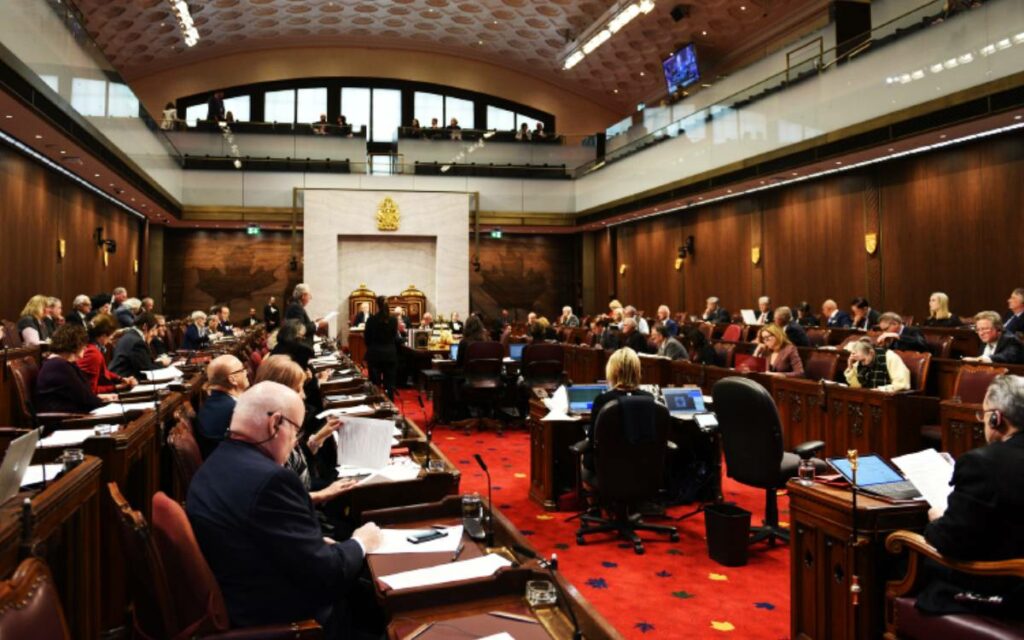
Senate left to tackle complex issues, while MPs opt for silence. Photo credit: Senate of Canada
Parliamentarians have something to be thankful for this week and no, it is not a stuffed belly, a day off, or Parliament being on break until Monday. Instead, it is the ability to pass the buck onto the Senate around the complex issues of bail reform.
In rare Ottawa fashion, there seems to be agreement from all political sides that the current bail system is not working. Last month, the government was able to unanimously pass, and expedite, Bill C-48, an Act to amend the Criminal Code (bail reform). Originally introduced in May following a spree of violent crime making the headlines across the country, the legislation was put on the back burner to pass the budget and focus on other key priorities.
Upon returning in the fall, violent criminals being released remained a pressing issue. A recent report from Statistics Canada shows that violent crime has increased for the second consecutive year, reaching the highest level since 2007.
Political pressure has also increased. In Ottawa, the Official Opposition demanded that the government “jail not bail” those charged with a violent crime. Provincial and territorial premiers who raised their concerns to the federal government echoed their concerns. Police services also publicly pressed the government to make changes following a spree of high-profile killings by repeat violent offenders, who in some cases had been released on bail.
The government responded with C-48, which aims to prevent offenders who have a violent criminal past from being released on bail. This legislation will expand a provision that would require the accused to argue why they should not be released while waiting for their trial, instead of the Crown having to show why they should remain in prison. The changes would also include those who have been convicted of a firearm offence, including breaking and entering to steal a firearm.
Following the bill’s rapid pace though the House, Senators were also encouraged by Canada’s Justice Minister, the person who introduced the bill, to quickly pass the legislation. As the Senate does, they have followed the government’s wishes and moved the bill swiftly though the Chamber and the committee process. Once the Senate returns next week, the bill will be reviewed by the Legal and Constitutional Affairs Committee before a final vote in the Senate. If no changes are made, the bill will become law.
It is understandable and easy to appreciate why these much-needed changes to Canada’s bail laws are required. The government’s efforts to fix the system is applaudable and should be commended.
Where the problem lies is the fact that the elected Members of Parliament opted out of debating and discussing these complex issues. Canadians elect these officials to have tough conversations about issues of national importance. These politicians have the ability to listen to experts, speak with their communities and make needed changes to legislation.
Instead, those elected to represent Canadians decided that bail reform is not the issue for them, and the Senate can fight over the details. Senators also heard from experts and amended the bill, but broadly speaking, their involvement with Canadians is different from those who are elected. They will not have to face voters on this issue, and these changes have the ability to negatively impact a number of Canadians.
Experts have indicated that legal aid clinics and those representing people who are Black, Indigenous, or otherwise marginalized could be the ones to be the most impacted by these changes. As Canada looks to make strides in improving relations with these groups, it is important that their voices be heard, and the impacts be fully understood.
As Canadians welcome the changes to our failing bail system, it is important that all politicians do their job even if that means getting along for an hour to pass an important bill.

Daniel Perry is a consultant with Summa Strategies Canada, one of the country’s leading public affairs firms. During the most recent federal election, he was a regular panelist on CBC’s Power and Politics and CTV Morning Ottawa.




















